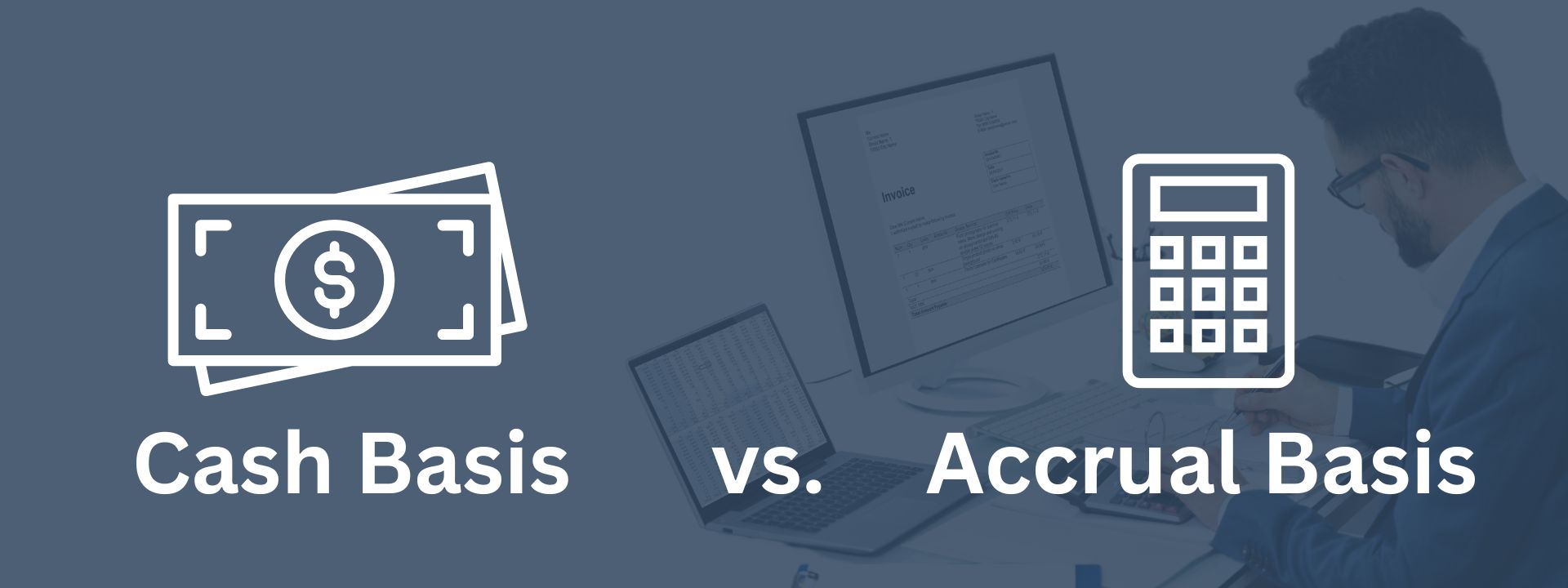At a Glance
Main Takeaway
As a private business owner, understanding the difference between cash and accrual accounting methods is essential to accurately interpret your company’s financial health. Each method has advantages and disadvantages.
Next Step
Choosing the right accounting method for your business depends on your industry, size, and cash flow. Understanding the differences ensures you keep accurate financial statements and minimize bookkeeping costs for your business.
What is Cash Basis Accounting?
Cash basis accounting is a method of bookkeeping in which a company records its financial transactions when cash is paid out or received. It is a simple accounting method ideal for small businesses with a low volume of transactions and does not require complex financial reports.
Under cash basis accounting, businesses recognize revenue when cash is received from a customer and expenses when money is paid to a supplier or vendor. This accounting method tracks a business’s cash at any given time. With cash basis accounting, it is easy to see a company’s available resources by looking at its bank statement.
Cash basis accounting is straightforward, making it an attractive option for small business owners because there is no need to keep a record of accounts receivable and payable. However, it has some limitations, such as not reflecting the business’s actual financial position at a given time.
What is Accrual Basis Accounting?
Accrual basis accounting refers to a method of bookkeeping in which a company records its financial transactions based on when they occur, regardless of when funds are received or paid out.
Under accrual basis accounting, revenue is recognized when earned, such as when a product is shipped, or a service is completed, regardless of when payment is received. Expenses are recognized when incurred, such as when a supplier delivers goods or services, no matter when the business makes a payment.
Accrual basis accounting provides a more accurate picture of a business’s financial position than cash basis accounting because it reflects current and future financial obligations. This method allows for better financial planning and forecasting, enabling companies to track their revenue and expenses in real-time.
Accrual accounting is more complex than cash basis accounting and requires a deeper understanding of accounting principles. It also requires businesses to keep track of accounts receivable and accounts payable to carefully monitor cash flow, which can be time-consuming and require additional resources.
Differences Between Cash vs. Accrual Accounting
Cash or accrual accounting methods offer your company different ways of recording financial transactions. Cash accounting does not have to adhere to U.S. generally accepted accounting principles (GAAP), and private companies can choose which method to use based on their specific financial circumstances.
In 2017, the Tax Cuts and Jobs Act introduced a provision that allows businesses with gross receipts of less than $25 million to use cash basis accounting, regardless of their industry or type of business. This change simplifies accounting for small businesses, reducing their administrative burden and increasing their ability to manage their cash flow.
Differences between cash and accrual accounting methods include:
Cash Basis Accounting | Accrual Basis Accounting |
Recognizes revenue and expenses when cash is received or paid out. | Recognizes revenue and expenses when earned or incurred, not when cash is exchanged. |
Provides a snapshot of a business’s current cash flow. | Provides a more accurate picture of a business’s financial position, taking into account future financial obligations like accounts receivable and accounts payable. |
Simple and easy to understand. | More complex and requires a deeper understanding of accounting principles such as prepaid expenses and unearned revenue. |
Suitable for small businesses with simple financial transactions. | Preferred by larger businesses with more complex financial transactions (and required for those with revenue over $25 million) |
Another difference between the two methods is how they can impact business taxes at the end of the year. For example, if you use cash basis accounting and send an invoice to a customer in December 2023, yet they do not pay until 2024, you will record this revenue on your 2024 taxes. However, if you use accrual accounting, you record the income on your 2023 taxes because you count the revenue when it is invoiced, not paid.
Example of Cash and Accrual Basis Accounting
To illustrate the principles of cash basis and accrual accounting, an example of how each method impacts a business’s cash flow can be helpful. Consider the following transactions for a private construction company:
- An invoice for $10,000 was sent for a completed roof installment project.
- A bill for $2,000 in contractor fees was received for work done this month.
- The company paid $100 in fees for bills received last month.
- The company received $5,000 from a client project invoiced last month.
Using the cash basis method, the profit for the month would be $4,900 ($5,000 in income minus $100 in fees).
Using the accrual method, the profit for the month would be $8,000 ($10,000 in income minus $2,000 in contractor fees).
This example illustrates how each accounting method shows a different picture of the business’s income stream and cash flow for the same transactions.
Whether your private business uses accrual or cash basis accounting, outsourced accounting services from Windes can help you maintain accurate, compliant financials. Our team of professionals can assist you with daily bookkeeping and accounting, including compiling cash or accrual financial statements, remote or on-site bookkeeping, and accounting policies and procedures.
Ensure Accurate Accounting for Your Business
At Windes, our experienced bookkeeping professionals are experts in the intricacies of cash-based and accrual-based accounting.
We offer a comprehensive range of outsourced bookkeeping services, from monthly bank statement reconciliation to managing cash transactions and ensuring the proper controls are in place.
Contact our Client Accounting Services today to get started on an Outsourced Bookkeeping Plan tailored to your business’s unique financial needs and future growth goals.


